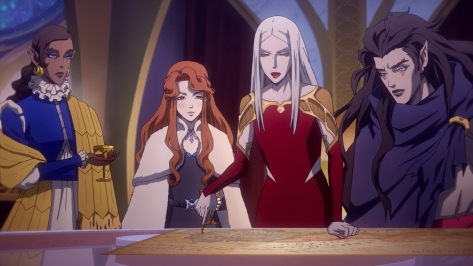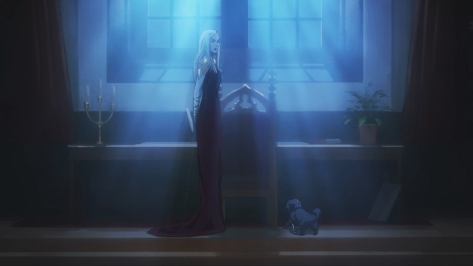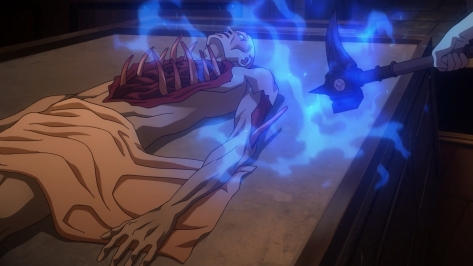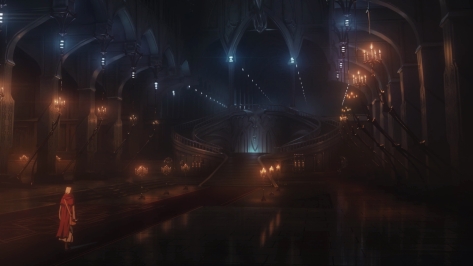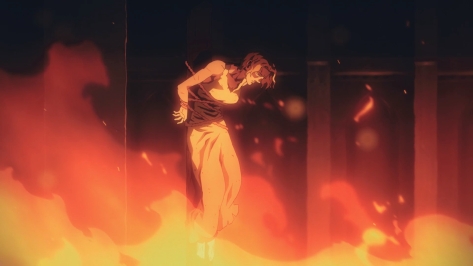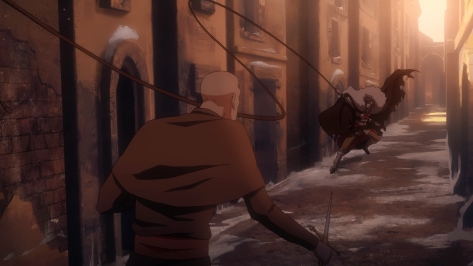Related: Castlevania Season 1 review (old)
Castlevania Season 2 review (old)
Similar: Vampire Hunter D: Bloodlust
Watched in: English & Japanese
Length: 32 episodes (4 seasons)
Positives:
- Vampire majesty
- Faithful adaptation without getting bogged down by the source material
- Brutally gothic in action and tone
- Political intrigue amongst excellent villains
- Great lore and magic
Negatives:
- Give me more, please
(Request an anime for review here.)
With the conclusion of the fourth season, Netflix’s Castlevania comes to a great end. Rather than do a review for the final season only, I thought I would go back and cover the full series in one place, give my overall thoughts on this triumph (no need to read the other reviews either).
My astonishment at the quality of a video game to film adaptation has been the greatest surprise throughout Castlevania’s run. I’m hoping this is the turning point where adaptations are things to look forward to rather than dread, similar to when comic books became good films more often than not. Superhero film fans are spoilt for choice these days. They don’t know of the Affleck Daredevil and Elektra days. Watching a good adaptation can sometimes make you forget the bad – the atrocious – such as Far Cry (anything by Uwe Boll, honestly), Dead or Alive, and the notorious Super Mario Bros. It’s hard to stress how weird it feels to see quality when the expectation is absolute ass.
For the newcomers, Castlevania is a long-running franchise of loosely connected games about a bloodline of vampire hunters from the Belmont family battling against creatures of the night, usually led by Dracula. The Netflix series roughly follows the third game, Dracula’s Curse, though pulls from several entries and brings much of its own material to the canvas. That last point is a key to Castlevania the animation’s success. Most adaptations fail because they don’t realise that gameplay comes first in [good] video games and trying to translate this to a cinematic only experience doesn’t work. There’s a reason the “princess is in another castle” trope is a common ailment of game stories (the recent God of War, for example), yet not often seen in film. Games use it to tack on another 5-hour gameplay world before, of course, the princess is again in another castle and you have another world to explore. It’s fine to want to be faithful to the source material, but there’s no point if it makes for a garbage film. Character, theme, tone, and style matter when adapting, not the gameplay mechanics or exact plot.
In terms of story, what makes Castlevania? Vampire hunters, vampires, monsters, magic, gothic, horror, religion, and labyrinthine castles. Your story isn’t a failure if your vampire hunter doesn’t jump and whip, jump and whip, jump and whip. It’s like those movies based on FPS games, where they think that because they have a scene in first person as a guy mows down fools with a gun, they’ve nailed it.
This series understands what makes for an engaging story in the world of Castlevania.
Enough preamble already, onto the review proper! This story opens on the meeting and courtship between the human Lisa and the vampire lord himself, Dracula. He teaches her science and medicine to help the local humans, which doesn’t please the Church, who see science as heathen magic and burn her at the stake. Dracula’s fury in response knows no equal and he unleashes a horde of demons upon the nation. Hell reigns.
Trevor Belmont, the last in his line of vampire hunters, drinks his way to the end of his days unmoved by the massacres nearby. A plea from some humans wakes him from his drunken haze and he finally does what he was born to do. He soon meets the magician Sypha.
Hearing this premise and knowing the video game origin, expectations are for little more than good guy fights series of bad guys to get to big bad guy in terms of story. However, Castlevania is so much more. In fact, there is enough material just amongst the villains to make a full series. Dracula’s court consists of vampires and humans, each with their own motivations and purpose in this story. Politics plays a larger part than action does in the conflict. They aren’t evil for the sake of evil. Dracula is the most powerful being on Earth, yet the death of his wife broke him. Isaac, one of Dracula’s Forgemasters (demon constructors), is waging a war against his own kind, whereas the other Forgemaster is a tad hesitant though no less involved. Some amongst the vampire “sisters” question their existence as vampires. Are they truly to rule for all eternity? Over everyone? The nuance to these villains (are they all villains?) particularly in later seasons had me glued to the screen.
A recurring problem in stories featuring secret societies of the supernatural is homogony within the society. The Underworld films (a guilty pleasure of mine), The Mortal Instruments, and Blade are but a few examples. How many stories have you seen where all the vampires (except maybe one) or werewolves or whatever supernatural race are the same? Where they have no lives saves for waiting around to drop from above in groups when someone walks down a back alley? They may as well be the clone troopers from Attack of the Clones for all the difference between them. This cliché stems from how people imagine other cultures. They see people in their own country are as varied as the plants and animals of the world, yet everyone in a distant country is one homogenous blob of whatever stereotype they know and not just as varied. Or the writers are just lazy. Of course, one story doesn’t have room for thousands of different personalities, but variety in what characters you do have goes a long way, even the villains.
On a hero front, Trevor’s “I’m so over this” attitude combined with his family duty makes for a fitting hero, a better choice than a typical “hero” in this gothic tale, and his chemistry with Sypha brings a touch of levity. Alucard is a more unusual character. Like his father, he’s powerful yet amongst the most mentally weak after having lived a sheltered life. I love the way he talks as well. His vocal mannerisms alone inform much of his experiences and mental state. And let’s not forget the charismatic has-been Saint Germain. What is he up to?
Even the minor characters are memorable, from the religious fanatics to the sentient demons. My only complaint with the characters is that we don’t get to see more of them. I could easily do with twice as many episodes of character interactions and vampire politics.
If action is more to your taste, Castlevania is excellent there as well. Apart from a few rough cuts, the animation is great and the action never feels generic. It’s always interesting to watch and improves with each season. Gory too, as it should be for a horror series. The massacre in episode one sets the tone perfectly.
Castlevania started as an animation to which I paid no attention. Now, I love it. It has a great start with four episodes as a proof of concept followed by a second season that brings the cast to strength, and then a third season elevates it to excellence with nuance before a final season delivers an explosive action finish. This is one of the best fantasy series I’ve seen in a long time. I can only hope future video game adaptations receive even half the care and effort as Castlevania has received.
Overall Quality – Very High
Recommendation: Watch it. Castlevania is a triumph of an adaptation and a fantasy series. I heartily recommend it.
(Request reviews here. Find out more about the rating system here.)
Awards: (hover over each award to see descriptions; click award for more recipients)
Positive:
Negative: None







